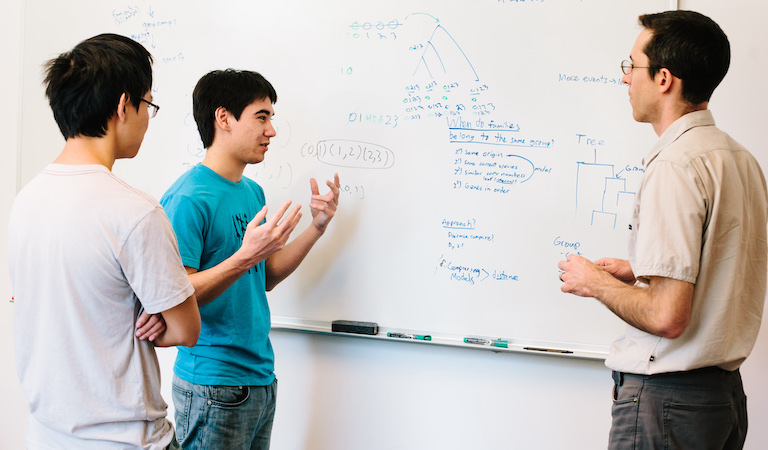Mathematical and Computational Biology

Sample Paths Through the Major
These paths are provided as examples; many other paths are possible, and you should work with your advisor to choose the best path for your interests.
Simple Path
Introductory Sequence (9 units)
- MATH055 HM – Discrete Mathematics
- BIOL054 HM – Experimental Biology Laboratory
- BIOL154 HM – Biostatistics (taken concurrently with Biology 54)
- MCBI118A HM – Introduction to Mathematical Biology
- MCBI118B HM – Introduction to Computational Biology
Biology Foundations (11–12 units)
- BIOL109 HM – Evolutionary Biology
- BIOL111 HM – Molecular and Cellular Biology Laboratory
- BIOL113 HM – Molecular Genetics
- BIOL189 HM – Topics in Biochemistry and Molecular Biology
Mathematical and Computation Courses (13–14 units)
- BIOL188 HM – Advanced Computational Biology
- MATH171 HM – Abstract Algebra I
- CSCI060 HM – Principles of Computer Science
- CSCI070 HM – Data Structures and Program Development
- CSCI140 HM – Algorithms (or MATH168 HM – Algorithms)
Electives, Thesis, and Colloquium (11.5 units)
- BIOL191 HM – Biology Colloquium
- CHEM056 HM – Organic Chemistry I
- MATH197 HM – Senior Thesis in Mathematics or BIOL193 HM – Senior Thesis Research: Biology
- MATH198 HM – Undergraduate Mathematics Forum
- One semester of MCBI199 HM – Joint Colloquium for the Mathematical and Computational Biology Major
Emphasis on Physiology and Modeling
Introductory Sequence (9 units)
- MATH055 HM – Discrete Mathematics
- BIOL054 HM – Experimental Biology Laboratory
- BIOL154 HM – Biostatistics (taken concurrently with Biology 54)
- MCBI118A HM – Introduction to Mathematical Biology
- MCBI118B HM – Introduction to Computational Biology
Biology Foundations (11–12 units)
- BIOL101 HM – Comparative Physiology
- BIOL103 HM – Comparative Physiology Laboratory
- BIOL108 HM – Ecology and Environmental Biology
- BIOL113 HM – Molecular Genetics
- BIOL185 HM – Special Topics in Biology
Mathematical and Computation Courses (13–14 units)
- CSCI060 HM – Principles of Computer Science
- MATH119 HM – Advanced Mathematical Biology
- MATH131 HM – Mathematical Analysis I
- MATH180 HM – Introduction to Partial Differential Equations
- MATH181 HM – Dynamical Systems
Electives, Thesis, and Colloquium (11.5 units)
- BIOL191 HM – Biology Colloquium
- CHEM056 HM – Organic Chemistry I
- MATH197 HM – Senior Thesis in Mathematics or BIOL193 HM – Senior Thesis Research: Biology
- MATH198 HM – Undergraduate Mathematics Forum
- One semester of MCBI199 HM – Joint Colloquium for the Mathematical and Computational Biology Major
Emphasis on Computational Neuroscience
Introductory Sequence (9 units)
- MATH055 HM – Discrete Mathematics
- BIOL054 HM – Experimental Biology Laboratory
- BIOL154 HM – Biostatistics (taken concurrently with Biology 54)
- MCBI118A HM – Introduction to Mathematical Biology
- MCBI118B HM – Introduction to Computational Biology
Biology Foundations (11–12 units)
- BIOL101 HM – Comparative Physiology
- BIOL103 HM – Comparative Physiology Laboratory
- BIOL109 HM – Evolutionary Biology
- BIOL113 HM – Molecular Genetics
- BIOL185 HM – Special Topics in Biology
Mathematical and Computation Courses (13–14 units)
- CSCI060 HM – Principles of Computer Science
- CSCI152 HM – Neural Networks
- CSCI153 HM – Computer Vision
- MATH119 HM – Advanced Mathematical Biology
- MATH131 HM – Mathematical Analysis I
Electives, Thesis, and Colloquium (11.5 units)
- BIOL191 HM – Biology Colloquium
- CHEM056 HM – Organic Chemistry I
- MATH197 HM – Senior Thesis in Mathematics or BIOL193 HM – Senior Thesis Research: Biology
- MATH198 HM – Undergraduate Mathematics Forum
- One semester of MCBI199 HM – Joint Colloquium for the Mathematical and Computational Biology Major